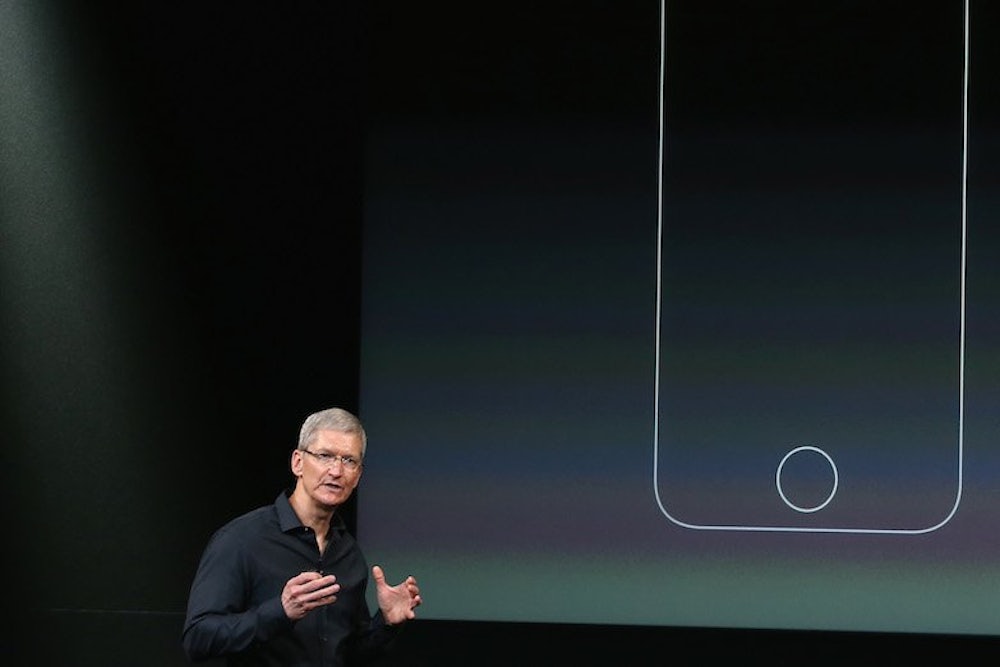By this point, if you are the type of person who cares about iterative change in mobile devices, you will already know all about how the latest version of the iPhone could improve your life. A slow trickle of whispers turned into a flood two weeks ago, when Apple sent out official invitations to its launch event at the Yerba Buena Center in downtown San Francisco. Prototypes surfaced, only to be exposed as fakes. Analysts predicted that sales of the new gadget could actually shift the nation’s GDP, and that the future of the company—now the most valuable U.S. company ever—rode on its success.
Apple launches have been media circuses for a while now. This year, though, something strange happened: Other companies started planning their own launch events around the new iPhone’s big day. As rumors of the September 12 drop date spread, Samsung, Google, Amazon, and Nokia scheduled glitzy rollouts for the week before, as if they didn’t even want to try giving off any light after the brightest star had gone supernova.
So not only does that tiny little gadget host your personal calendar—nowadays it also sets the retail calendars for a host of great big companies.
How did we get to the point where it seems totally normal that every Apple product launch should be anticipated with the kind of buzz normally reserved for the Super Bowl and the second coming of Christ? The point where now, all big announcements take the form of a company founder parading around on stage with the revolutionary new object in his hands?
The answer is one that makes sense, considering how Apple normally does business: Steve Jobs simply reinvented the form, and everybody else followed suit.
Back in the 1980s, buzz didn’t come when Apple commanded it. Instead, it waited for the one of the two times of year when all the world’s Mac heads gathered in one place: The MacWorld Expo, held on both the east and west coasts. New products would be announced in “keynotes,” and the news would filter out from there.
The evolution began when Jobs returned to Apple in 1996, after the company had weathered a few years of declining profits. Jobs spent a few years trimming down the company‘s offerings and rolling out new ones, like the iMac (introduced at the Paris Expo in 1998) and iBook (New York, 1999). The problem was, MacWorlds forced Apple to time its product development to dates scheduled years in advance, and to make its announcements on the terms of the International Data Group, which ran the conference.
For its most pathbreaking product yet—the iPod—Jobs didn’t want to wait. After hyping the release of “not a Mac” for a couple weeks in October 2001, he brought the media to an auditorium at Apple’s Cupertino campus. Reactions were mixed, with some analysts lauding the sleek design and others deriding its $399 price tag. But at least when Jobs said it had something real to announce, people believed him.
“As Apple got more success, they realized they could do what the did with the MacWorld Expo anytime, anywhere,” says Jason Snell, editorial director at MacWorld, a publication owned by IDG. “Apple can now just call an event, and everyone will come. And that leads us to everybody else saying, we can do that too, to varying degrees of success.”
Years later, an Apple launch is an almost ritualistic thing: The company keeps a tight lid on any actual information, allowing rumors to fester (in advance of today’s launch, Mac nerds interpreted the rainbow design on the Yerba Buena center as a subliminal hint that the new iPhone would have a wider screen). Invites are highly coveted, and journalists fly from across the country to attend—since the event isn’t streamed online, they’ve got no choice, if they want the news with everyone else. The CEO walks the audience through the product’s specifics, including the date when it will actually go on sale, before allowing the audience to actually play with the new device.
In 2009, Apple announced that it would no longer participate in the MacWorld conferences at all; Its product launches had created their own center of gravity. Now, other technology companies introducing phones and tablet computers do basically the same thing, if they can pull it off.
“As Jobs started doing it, and more often, they took on a life of their own,” says Snell. “Breaking news about technology is really kind of boring. And Jobs, his contribution was turning it into theater.”
Of course, that task now falls to Apple’s new CEO Tim Cook, and this will be the first performance he gives without Jobs watching from afar. Thanks to the media machine Jobs created, though, most of the work is accomplished before he even sets foot on stage.
